| Introduction |
|
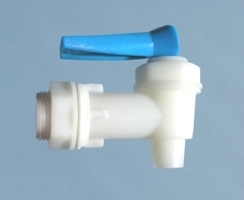 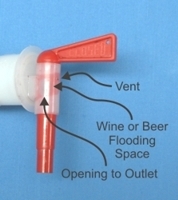
General Purpose Tank
Valves
- Not Recommmended For
Winemaking or Brewing -
General purpose tank valves can be installed in
BetterBottle carboys as easily as they can be installed in any other
type of carboy. However, BetterBottle does not recommend their use
for winemaking or brewing: 1) They typically seal against the
outside walls of carboys or pails, leaving the crevices associated
with the threads and nuts on the inside of the container; 2)
Maintaining their proper orientation while tightening their seals is
problematic, even with a specilaized tool, because the nuts are not
easily accessible inside a carboy; 3) They cannot be adjusted for
variable sediment levels; 4) They will not drain the last 2 inches
(5 cm) of liquid from a carboy without tipping the carboy and
potentially disturbing sediments, because they cannot be installed
any lower; 5) They can be difficult to disassemble for cleaning and
sanitizing; 6) They may not be made of materials intended for
winemaking and brewing; 7) It can be difficult to connect hoses or
bottling stems to them; and 8) Some are not designed with elastomer
compression seals, so a film of wine or beer is likely to
communicate between the inside of the carboy and the valve outlet
when the valve is in the closed positon - a situation that is very
likely to cause the wine or beer to become
contaminated.
SimpleFlo™ Valve
System
- Attached to Adjustable
Carboy Racking Adapter -
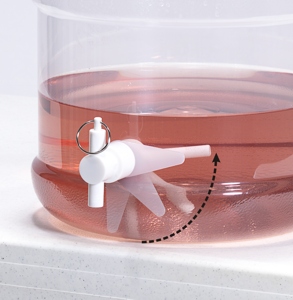
The BetterBottle
SimpleFlo™ Valve and BetterBottle Racking Adapters (see the
Racking
Adapters tab at the left side of
this page) make up the first valve system for carboys and
pails that truly addresses the specialized needs of home winemakers
and home brewers. This system makes it possible to rack and bottle
professionally, without siphons or pumps. The components are
constructed of an incredibly tough, proprietary PET that does not
stain or impart flavors and is easily cleaned and sanitized.
SimpleFlo Valves have a simple flow path, to prevent
clogging. They are simple to operate. They are simple
to disassemble and reassemble, making thorough cleaning and
sanitizing especially easy. And Viton elastomer O-rings, which are
amazingly resistant to harsh chemicals, are used to achieve tight
compression seals. But that is not all. SimpleFlo Valves are also
designed to rotate in BetterBottle Racking Adapters - hoses can be
attached even when a carboy is on the floor. And 3/8" OD polyolefin
tubing and bottling stems plug directly into SimpleFlo Valves (see
below).
Additional Information -
Use the popup menus associated with the Racking Adapter and SimpleFlo
Valve tabs at the left side of
this page for random access to all the specific information relating
to the SimpleFlo Valve and BetterBottle Racking Adapters for carboys
and pails. Use the How-To
Tips tab at the left side of this
page for information about how to use BetterBottle
components.
Chemical Resistance of
BetterBottle SimpleFlo Valves - In
general, avoid very strong caustics, such as KOH and NaOH (lyes),
and concentrated aliphatic ketones (e.g., essence oils). For
additional materials specifications, please refer to the
Technical tab at the top of this page.
 Super Stainless Pull-Ring
& Clip - In 2005, BetterBottle
began making the pull-rings and clips for SimpleFlo valves from an
especially corrosion resistant stainless steel. To replace older
pull rings and clips order a BB-VALVE(HF)-SERV service kit (see
below) from your dealer. Super Stainless Pull-Ring
& Clip - In 2005, BetterBottle
began making the pull-rings and clips for SimpleFlo valves from an
especially corrosion resistant stainless steel. To replace older
pull rings and clips order a BB-VALVE(HF)-SERV service kit (see
below) from your dealer.
|
|
Description |
|
The BetterBottle SimpleFlo valve can be used
in line with hoses or as an outlet for pails and BetterBottle
carboys. The valve can be opened for partial or full flow and closed
in the blink of an eye. Its wide, simple flow path resists clogging
and it can be disassembled and reassembled for cleaning or
inspection in a matter of seconds - without
tools.
|
|
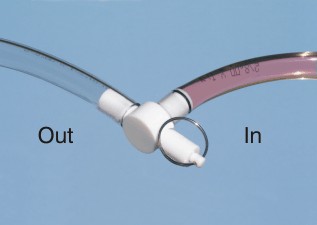 |
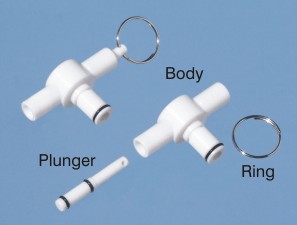 |
| In-line Use
of SimpleFlo Valve |
Components
& Assembly | |
|
Note: SimpleFlo
valves operate well under a wide range of conditions; however, they
may develop leaks if they are subjected to temperatures in excess of
75° C (167° F).
|
| Operation |
|
|
The SimpleFlo valve is designed to lock in the
closed or open position by moving the plunger as far as it can
travel in the appropriate direction (see image below). A slight
increase in resistance to the movement of the plunger near the
limits of travel signals the transition from adjustable flow to a
locked position. When a valve is being opened and closed repeatedly
at short intervals, it is not necessary to move the plunger all the
way to a locked position; however, it should be locked if it is to
be left unattended. |
|
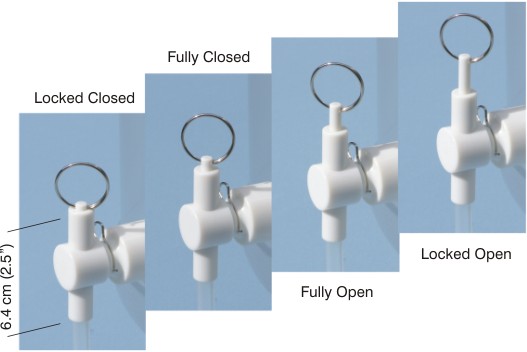 |
|
The input of the SimpleFlo valve
is primarily designed to mate in quick-disconnect fashion with
BetterBottle Racking Adapters for carboys and pails (see the
Racking Adapter tab to the left of this
page); however, the input will also push into 1/2" ID tubing. The
output side is designed to make connection with food-grade 1/2",
3/8", and 1/4" ID polyolefin tubing (see
figure below) as well as 3/8" OD bottle filling tubes (see the
How-To Tips tab to the left of this
page). BetterBottle does not recommend vinyl and rubber tubing (see
the Tubing
(PET-Lined) tab to the left of this page)
Hose clamps
should not be necessary for low-pressure applications. If clamps are
necessary, use plastic clamps. Metal screw clamps can apply uneven
pressure to small-diameter tubing and distort the bodies of
SimpleFlo valves.
Note: Never use pliers or other
mechanical gripping devices to install or remove
tubing. |
|
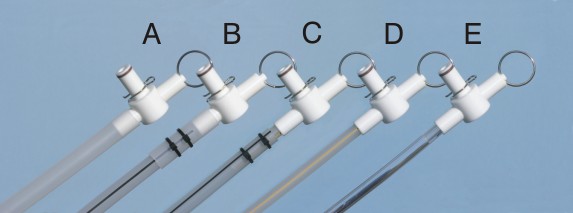
A) 1/2" ID PET-lined tubing
pushes over the output port. B) 3/8" ID PET-lined tubing can
be coupled to the output port with a short length of 1/2" ID
PET-lined tubing. C) 3/8" ID PET-lined tubing can be coupled
to the output port with a short piece of 1/4" ID PET-lined tubing.
D) 1/4" ID PET-lined tubing pushes into the output port.
E) Soft 3/8" ID tubing is coupled to output port with a short
piece of 1/4" ID PET-lined tubing.
|
| Cleaning /
Sanitizing |
|
The special PET from which BetterBottle
SimpleFlo valves are made has a non-porous, hydrophobic surface,
making it extremely easy to clean and sanitize. SimpleFlo valves may
be damaged by temperatures exceeding 75° C (167° F). Read the
Wash/Sanitize section, under the Technical tab
at the top of this page, for important informaton.
The PET is very tough and will not scratch easily, but take
precautions not to scratch the precision, smooth, sealing surfaces.
Always rinse SimpleFlo valves thoroughly in clean water before
storing them.
Abrasive scouring pads and cleansers should
never be required or used.
Soaking metal parts in
cleaning or sanitizing solutions can cause corrosion - they should
be removed.
Service
- It should not be necessary to remove
SimpleFlo valve O-rings for routine cleaning and sanitation. If an
O-ring requires replacement, do not use sharp tools that might cut
the O-ring or scratch the walls of the groove. Pinch a short segment
of the O-ring into its groove with a finger nail and use the other
hand to rub the rest of the O-ring around the groove and toward the
pinch. The O-ring will stretch and bulge up so it can be rolled out
of the groove. Use only BetterBottle O-rings for replacement; they
are made of special materials that cannot be easily obtained through
hardware suppliers and other materials may not function
correctly.
If a SimpleFlo valve leaks at point #2, the
SimpleFlo valve plunger is not sealing properly. To disassemble a
SimpleFlo valve, rotate the wire ring through the hole in the end of
the plunger shaft, pulling the end of the wire slightly to the side,
so the ring unscrews out of the hole (see assembly photo
under Description above). Then, push the plunger out the end of the
valve body. Check the O-rings for cuts and the valve bore for
scratches or debris by looking down the bore toward a source of
light. If the O-rings and bore appear to be in good condition, check
the O-ring grooves for scratches or debris. To reassemble the valve,
push the plunger into the valve body and screw the wire ring
back through the hole in the end of the plunger shaft by pulling the
end of the wire slightly to the side.
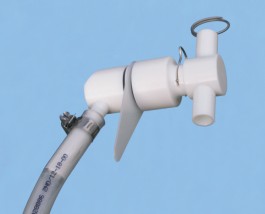 | If
a SimpleFlo valve / Racking Adapter assembly leaks at point #1,
there are a number of possible causes: 1) The large O-ring on the
SimpleFlo valve has been damaged or its groove is scratched or
dirty, 2) The bore of the Adapter is scratched where it seals with
the large O-ring on the SimpleFlo valve, or 3) The Racking Adapter
is not sealing against the inner wall of the carboy or pail and
liquid is creeping along the thread of the Racking Adapter to the
first point where it can escape, which is at point #1. If the first
and second causes can be ruled out, recheck the installation of the
Racking Adapter (see the Racking
Adapter tab to the left of this
page for service advice).
To confirm that the valve seals of a SimpleFlo
valve / Carboy Racking Adapter assembly are in good condition, use a
hose to connect the stem of the Adapter to a faucet and apply water
pressure. A pressure of between 1 and 2 bar (15 and 30 PSI) is
recommended. Higher pressures may cause the valve to pop out of the
Racking Adapter. Open the SimpleFlo valve to let the connecting hose
fill with water and then close the valve, dry off the parts, and
check for leaks.
If a pull-ring or
clip shows signs of corrosion, order a set of repair parts (see Part
Numbers below) and replace them. The pull-ring and clip are
currently made of very corrosion-resistant stainless steel.
|
| Part
Numbers |
|
SimpleFlo™ Valve -
BB-VALVE(SF)
Replacement set of O-rings, retainer clip,
and pull ring for SimpleFlo Valve - BB-VALVE(SF)-SERV
|
| Packaging |
|
Harmonized System Code - 3923.30.90.90
applies to these parts
BB-VALVE(SF)
-
Individually packed in a hang-hole,
zipper bag
Bags of 20 individual
packages - 1.41 lbs (0.64
Kg)
| |